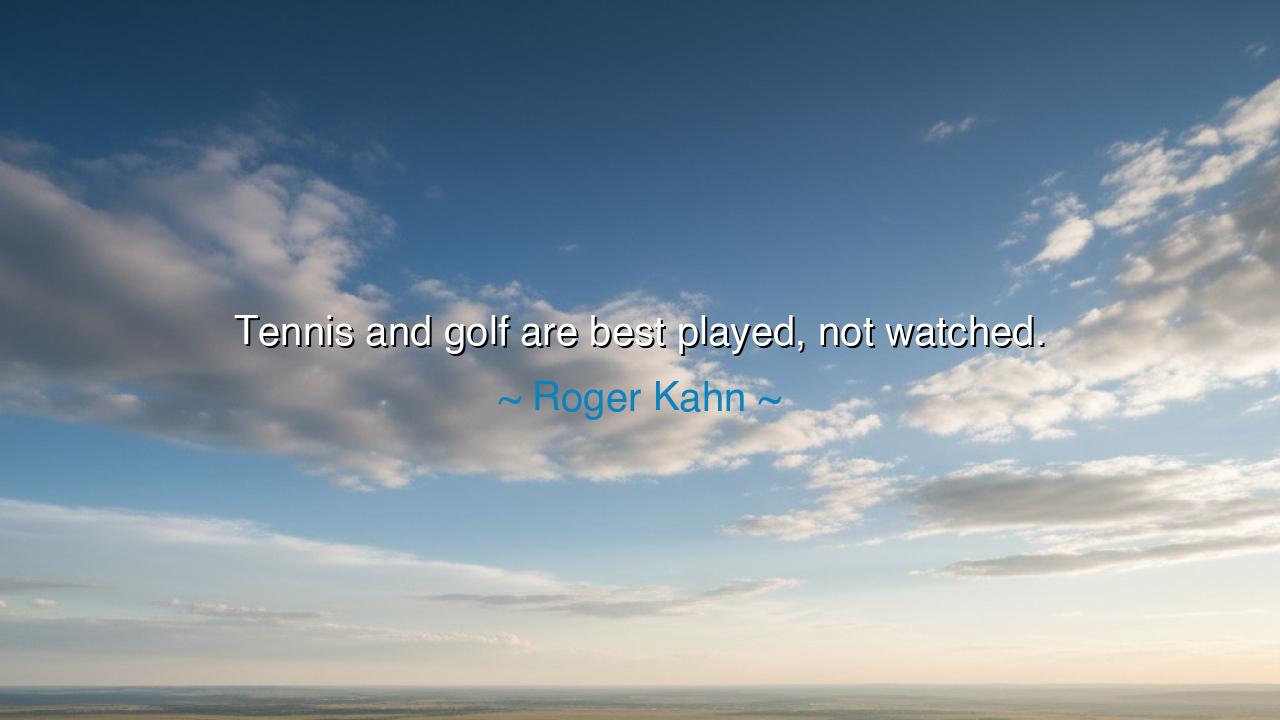
Tennis and golf are best played, not watched.






In the chronicles of sport and spirit, the writer Roger Kahn, who captured the soul of games with the grace of a poet, once proclaimed: “Tennis and golf are best played, not watched.” At first, his words seem but a preference, a small observation. Yet when examined with the eye of wisdom, they reveal a teaching far deeper: that the true worth of certain endeavors is not found in passive observation, but in the living act itself, where the body moves, the heart strains, and the soul is tested.
For tennis and golf are not spectacles of constant frenzy, like the clash of football or the roar of battle on the diamond. They are games of patience, of rhythm, of quiet intensity. To watch them is to glimpse their surface, but to play them is to step into their mystery. The subtle shift of the wrist on the serve, the careful alignment of the putt, the tension of silence before motion—these things are not fully known to the spectator. They are truths discovered only in the act, when one stands with racket or club in hand, facing the challenge oneself.
The ancients knew this distinction well. Consider the art of philosophy in the schools of Greece. To watch a master like Socrates speak was stirring, but to engage in dialogue, to wrestle with the questions, to taste the struggle of thought—this was the true heart of learning. So it is with these sports. To watch may entertain, but to play is to become part of the art, to live within its discipline and its joy. Kahn reminds us that life’s richest treasures cannot be consumed by the eye alone; they must be embodied.
There is also humility in his teaching. Golf and tennis are games where perfection is always sought, but never fully attained. To watch a champion like Federer or Nicklaus is to marvel at grace. But to play oneself is to taste the struggle, to feel the stubbornness of the ball, the betrayal of the wind, the rebellion of one’s own body. It is in this struggle that the true meaning lies—not in the flawless vision of greatness, but in the imperfect striving toward it.
We see this wisdom illustrated in the life of Abraham Lincoln, who once said that knowledge is best gained by “doing.” He taught himself law not by listening alone, but by practicing, failing, correcting, and persevering. Just as Kahn counsels that these games are “best played,” so Lincoln shows that life itself is best lived in action, not passivity. To sit and watch others struggle and triumph is pleasant; but to enter the contest yourself, though you stumble, is the path to wisdom and growth.
Thus the lesson is clear: whenever possible, be not a spectator of life, but a participant. Watch, yes, when others inspire you, but do not stop there. Take up your own racket, your own club, your own calling. Struggle with it, learn from it, discover in your failure the seeds of triumph. For as Kahn reminds us, the true joy is not in the observing but in the living, not in the watching but in the doing.
So let these words be carried forward: “Tennis and golf are best played, not watched.” And not only tennis and golf, but all the arts of life—friendship, labor, love, and truth—are best practiced, not merely observed. Be the player, not the spectator. Be the doer, not the dreamer. Enter the arena, however small, and let the lessons of effort, patience, and joy transform you. For in playing, you will find the heart of the game—and in living, you will find the heart of life itself.






AAdministratorAdministrator
Welcome, honored guests. Please leave a comment, we will respond soon